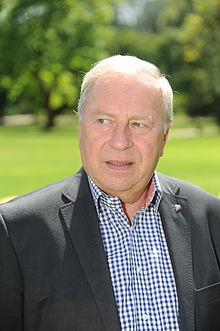Jerzy Stuhr
| Jerzy Stuhr | |
|---|---|

Jerzy Stuhr in 2015
|
|
| Born |
Jerzy Oskar Stuhr 18 April 1947 Kraków, Poland |
| Occupation | Actor, Director |
| Years active | 1971–present |
| Spouse(s) | Barbara |
| Children | Maciej, Marianna |
Jerzy Oskar Stuhr (Polish pronunciation: [ˈjɛʐɨ ˈʂtur]; born 18 April 1947) is one of the most popular, influential and versatile Polish film and theatre actors. He also works as a screenwriter, film director and drama professor. He served as the Rector of the Ludwik Solski Academy for the Dramatic Arts in Kraków for two terms: from 1990 to 1996 and again from 2002 to 2008.
Stuhr was born in Kraków. His ancestors, Leopold Stuhr and Anna Thill, migrated to Kraków from Mistelbach, Austria, shortly after their wedding in 1879.
Having obtained a degree in Polish literature from the Jagiellonian University in 1970, Stuhr spent the next two years studying acting at the Academy for the Dramatic Arts in Kraków (Państwowa Wyższa Szkoła Teatralna often shortened to PWST), where he became a professor.
From the early 1970s, Stuhr appeared in Polish theatre and worked in film productions, making his debut with the role of Beelzebub in Adam Mickiewicz's Dziady directed by Konrad Swinarski.
Having met film director Krzysztof Kieślowski in the mid-1970s, he continued to work with him until Kieślowski's death in 1996. To an international audience, Stuhr may be best known for his minor role as thick-witted hairdresser Jurek in Kieślowski's Three Colors: White, in which he starred alongside Julie Delpy, Janusz Gajos, and Zbigniew Zamachowski. In Poland and nearby countries, he is probably best known for the part of Max in Juliusz Machulski's 1984 dystopian cult comedy Seksmisja (one of the most popular Polish movies), and – to a younger audience – for lending his voice to the talking donkey in the dubbed Polish version of the Shrek trilogy. Other important films include Kieślowski's The Scar (Blizna, 1976), Camera Buff (Amator, 1979) and Part 10 of The Decalogue series (1988), Machulski's Kingsize (1987), Kiler (1997) and Kiler 2 (1999), and Zanussi's Life for Life (1988). Stuhr also worked with Polish directors Agnieszka Holland, Andrzej Wajda and Krzysztof Zanussi.
...
Wikipedia
